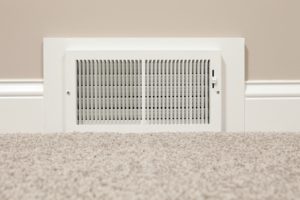Open vs Closed AC Vents in Unused Rooms. The Big Debate
It shouldn’t come as a surprise that the United States is the world’s biggest electricity consumer when it comes to energy use per capita. According to the U.S. Energy Information Administration, the average U.S. residential customer uses approximately 909 kWh per month of energy, or around 10,909 kWh per year. New Jersey average household energy bills are among the highest in the country and nearly half of the energy used in typical NJ home goes towards heating and cooling costs. These days, many of us are looking for easy ways to become energy efficient and often wonder about the “big debate” regarding your AC vents in unused rooms.
Before we reveal the answer, let’s dive into some basic ventilation principles.
How Does Ventilation Work?
Contents
Houses need to breathe. Some experts recommend that one half of a home’s air volume should be exchanged every hour; they should draw in fresh air and exhaust the stale air. Ventilation, therefore, is very important.
Most homes have closed systems that includes controlled filtration to keep air clean and clear. But as a closed system, this means that nothing internally is moving the air around. A blower fan works to circulate the air throughout the home and then that moving air redistributes heat by either picking it up from the furnace or dumping it into condenser coils. It’s important to note, however, that the motors used in blower fans are not all the same.
Problems with Pressure
Variable motors are able to adjust themselves based on the amount of pressure, but the other (which is more commonly used in homes) runs at the same rate regardless of external conditions. This brings us to the big debate about air vents.
Whether you realize it or not, your HVAC unit has been specifically sized to suit the needs of your home. Whether you’re heating or cooling, the amount of air that your blower fan is able to circulate has been matched to the flow rate of your ventilation system and square footage of your home.
The Conclusion? Leave AC Vents Open
It may seem counterintuitive at first. But think of it like this: closing AC vents has the same effect as a dirty air filter can have. A dirty filter restricts air flow, reducing the cooling capacity of your air conditioner. The same thing happens with closed vents.
When you close an air vent, the number of avenues available to move air is reduced, restricting the flow. A reduction in air flow is a problem for effective cooling and heating. The increased pressure results in a higher chance for air to escape through existing leaks or possibly to cause a new leak in your ducts. Unfortunately, this also means your home is most likely working harder to circulate air.
The same holds true for doors as well: leave the doors to unoccupied rooms at least partially open to allow free air flow throughout your house.
Of course, if you have a variable motor, the pressure and airflow won’t be an issue.
Trust in Point Bay for Your Next Air Conditioning Inspection NJ
If you’re in Ocean County and your AC is due for an inspection, the experts at Point Bay Fuel are ready to help! Just contact us at (732) 349-5059 to arrange for an inspection to rest assured that you will have a cool, trouble-free summer.
